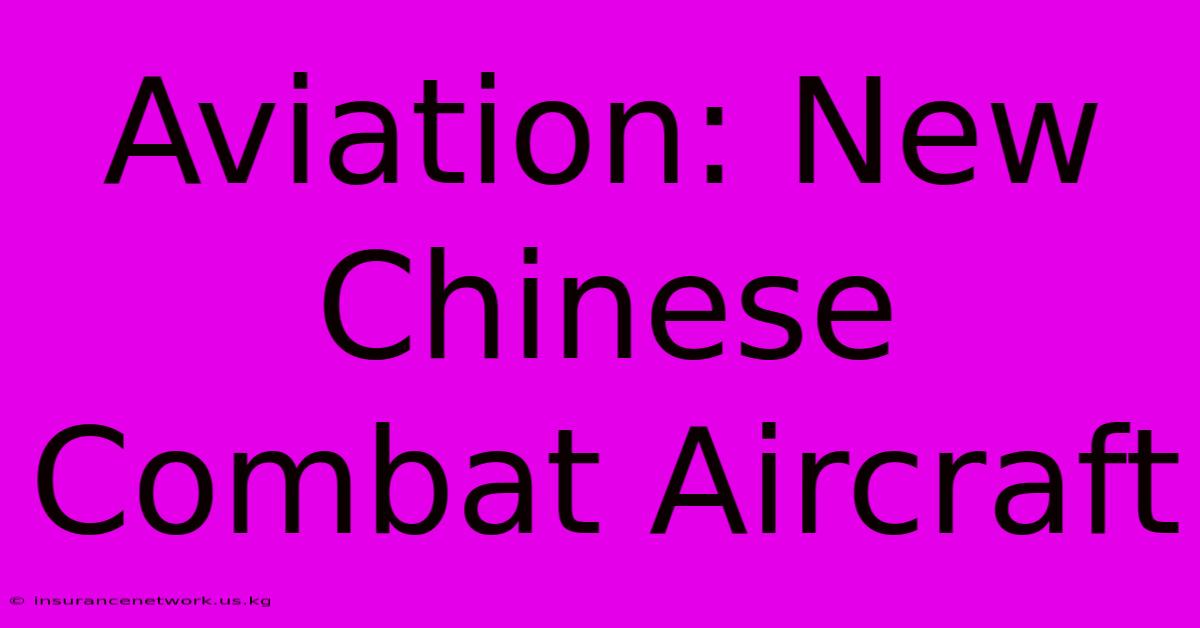Aviation: New Chinese Combat Aircraft

Discover more detailed and exciting information on our website. Click the link below to start your adventure: Visit Best Website insurancenetwork.us.kg. Don't miss out!
Table of Contents
Aviation: New Chinese Combat Aircraft – A Rising Power in the Skies?
China's advancements in aviation technology are undeniable, and its development of new combat aircraft is a significant factor shaping the global military landscape. This article delves into the latest developments, exploring the capabilities and implications of these emerging aerial platforms.
The J-20: A Stealth Fighter Jet for the 21st Century
The Chengdu J-20, a fifth-generation stealth fighter jet, is arguably China's most significant contribution to modern air combat. Its stealth capabilities, advanced avionics, and supercruise function position it as a formidable adversary.
Key Features and Capabilities of the J-20:
- Stealth Technology: Designed to reduce radar signature, making it difficult to detect.
- Supercruise: Ability to sustain supersonic speeds without afterburner, crucial for maintaining air superiority.
- Advanced Sensors and Avionics: Equipped with sophisticated radar, electronic warfare systems, and data links.
- Air-to-Air and Air-to-Ground Capabilities: Capable of carrying a range of missiles and precision-guided munitions.
The J-20 represents a significant leap forward for Chinese air power, challenging the dominance of established players like the United States. Its deployment signifies a shift in the balance of power in the Asia-Pacific region and beyond.
The J-16: A Multirole Fighter Jet with Significant Reach
The Shenyang J-16 is a heavy, twin-seat, multirole fighter jet based on the Russian Sukhoi Su-27 design, but significantly upgraded. It demonstrates China's ability to not only develop its own designs but also to adapt and improve upon existing technologies.
Key Features and Capabilities of the J-16:
- Powerful Engines: Ensuring high speed and maneuverability.
- Advanced Radar System: Providing superior target acquisition and tracking capabilities.
- Long Range: Enabling it to project power over significant distances.
- Versatile Weapon Payload: Carrying a wide range of air-to-air and air-to-ground weapons.
The J-16 serves as a vital component of China's air force, providing a robust and versatile platform for various combat scenarios. Its long range and substantial payload significantly enhance China's regional power projection capabilities.
Beyond the J-20 and J-16: Future Developments and Implications
China's aviation industry continues to evolve rapidly. Beyond the J-20 and J-16, there are ongoing developments and rumors surrounding next-generation aircraft, potentially incorporating advanced technologies like directed energy weapons and artificial intelligence.
The implications of China's advancements in combat aircraft are multifaceted. They impact:
- Regional Security: Altering the strategic balance of power in the Asia-Pacific region and potentially triggering an arms race.
- Global Geopolitics: Challenging the existing global order and influencing international relations.
- Technological Innovation: Driving innovation in aerospace technology and pushing the boundaries of military capabilities.
Strong technological advancements in the Chinese aerospace industry highlight the nation's growing military might. These new combat aircraft represent a significant shift in the global balance of power and demand ongoing monitoring and analysis. The future of aerial combat is rapidly evolving, and China is playing a leading role in shaping that future. Further research into these developments and their implications is essential for a thorough understanding of the shifting global military landscape.

Thank you for visiting our website wich cover about Aviation: New Chinese Combat Aircraft. We hope the information provided has been useful to you. Feel free to contact us if you have any questions or need further assistance. See you next time and dont miss to bookmark.
Featured Posts
-
Heats Riley Quashes Team Speculation
Dec 27, 2024
-
After Christmas Sale Deals 2024
Dec 27, 2024
-
Teddy Bridgewaters Lions Return
Dec 27, 2024
-
Lions Add Bridgewater To Roster
Dec 27, 2024
-
Butler Staying Put Miami Heats Decision
Dec 27, 2024
